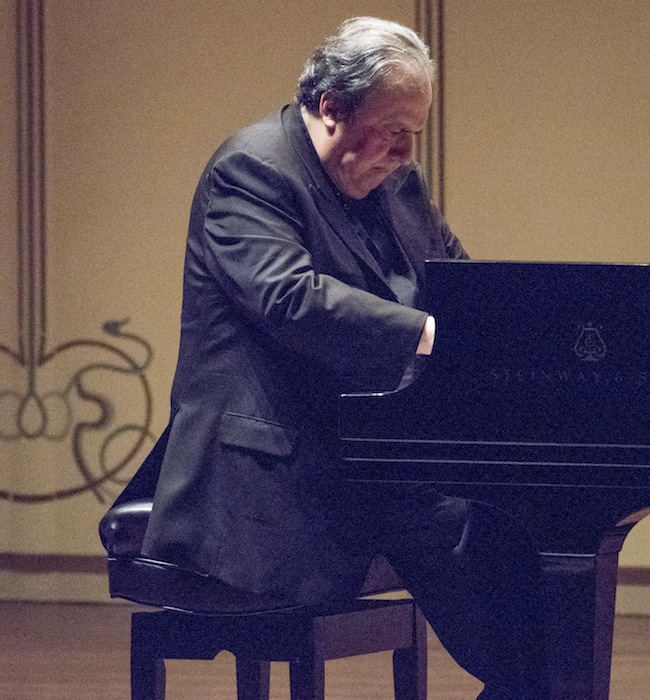Bronfman ignites a Prokofiev storm at Ravinia

Yefim Bronfman performed Prokofiev piano sonatas Tuesday night at the Ravinia Festival. Photo: Pedro DeJesus
In Chicago, one tends to associate Yefim Bronfman with music of Brahms, the composer most often highlighted in his local recitals and collaborations with the Chicago Symphony Orchestra.
Tuesday night at the Ravinia Festival, the celebrated pianist displayed equally convincing mastery in music of Serge Prokofiev, with the first of two programs devoted to the Russian composer’s complete piano sonatas.
Hearing these fiery, idiomatic performances one could hardly think of an artist better suited to this repertory. With his fearless technique, hair-trigger explosiveness and sonorous power, Bronfman made a firm case for the sonatas as Prokofiev’s most consistent achievement in any genre.
Tuesday’s program of six sonatas at the Martin Theatre concentrated largely on early works with just one of the late “War Sonatas.” Yet the invention and individuality in this less-encountered music proved nearly as striking in the hands of Bronfman, who played all but one of the sonatas (No. 5) from memory.
The burly pianist came out, quickly bowed, sat down and immediately launched into Prokofiev’s Sonata No. 1 in F minor, the composer’s Opus 1. Written at age 15, this seven-minute single movement betrays influences of Tchaikovsky and Scriabin yet Bronfman deftly underlined the creative way forward, pointing up the contrasts between fragile lyricism and youthful sturm und drang.
The composer made a great leap just two years later with his Second Sonata. The four-movement work was a regular staple of Prokofiev’s own recitals and marks his first substantial achievement in the genre. His mature style is evident here in embryonic form and was conveyed by Bronfman’s performance, which captured the quirky contrasts and mercurial mood shifts with force and alacrity. The wryly satiric touch and nervy bursts in the hand-crossing Scherzo made firm impact and Bronfman charted the somber rumination of the Andante equally well. The Vivace finale draws upon Prokofiev’s full arsenal of brilliant and virtuosic effects, all surmounted by the pianist in a thrilling, propulsive finale.
The Third and Fourth sonatas carry the subtitle “From Old Notebooks,” both drawing on themes jotted down by the composer years before. One is struck in these works by one of Prokofiev’s best traits, his ability to make strong and expressive points with great economy.
The taut single-movement Third Sonata atomizes Prokofiev essentials with its subdued introspection, dotted rhythms and breakout bravura, rendered cohesively by Bronfman. Dedicated to a close friend who committed suicide, No. 4 has more brooding introspection than most of the sonatas, and here Bronfman surveyed the dark rumination as surely as the agitated desperation in the hard-charging finale.
The Fifth Sonata offers pages of virtuosity as well, but overall it’s a more restrained and light-hearted work than most in the set, with an off-center, elliptical charm. Bronfman kept the music in scale, bringing out the playful caprice of the closing Allegretto especially well.
The Seventh is the middle work of Prokofiev’s three “War Sonatas,” his crowning tripartite achievement in the genre. As fine as Bronfman’s performances of the preceding works had been, his full-metal assault on the Seventh Sonata was extraordinary. The pianist put across the malign. mechanistic power of the opening movement with alarming intensity, yet relaxed naturally and expressively into the uneasy repose of the Andante.
The finale unsparingly paints the violence and carnage of war, and Bronfman built the ostinato motif with relentless force and mounting power. Just when it seemed impossible for his playing to get any faster or louder it did, and the crescendo reached a peak of massive sonority and sonic fury.
No encore was offered or needed. The pummeled Steinway deserves a rest.